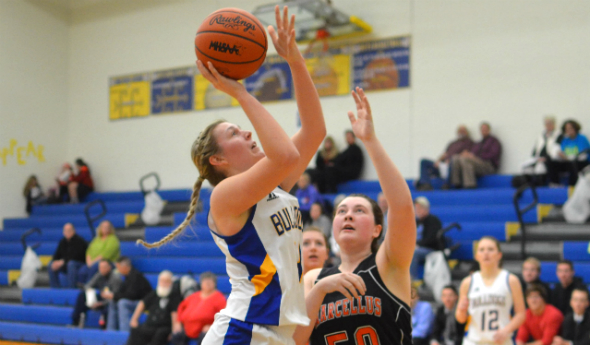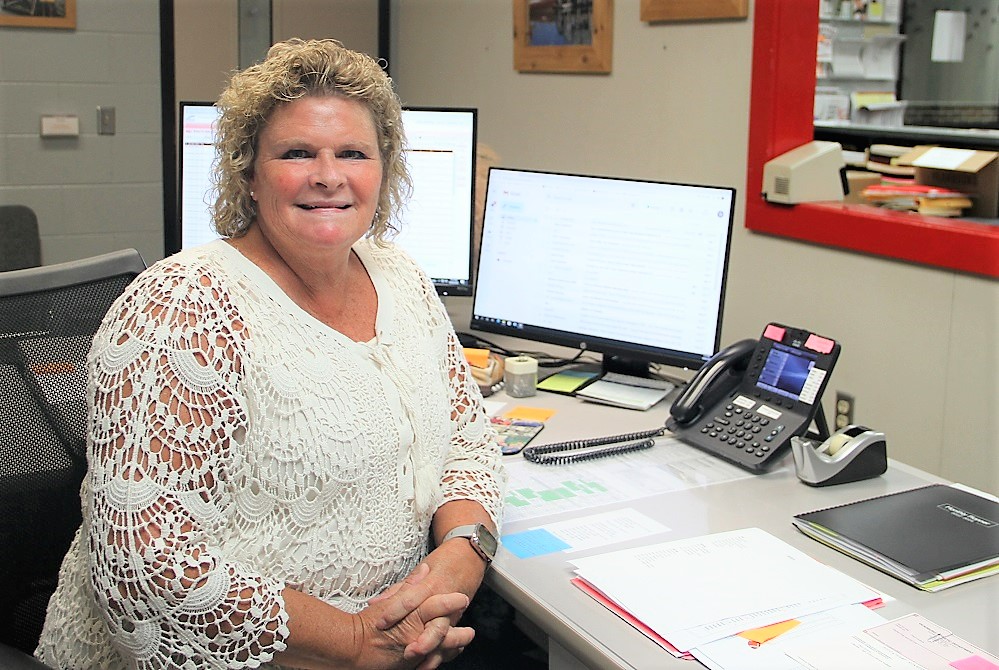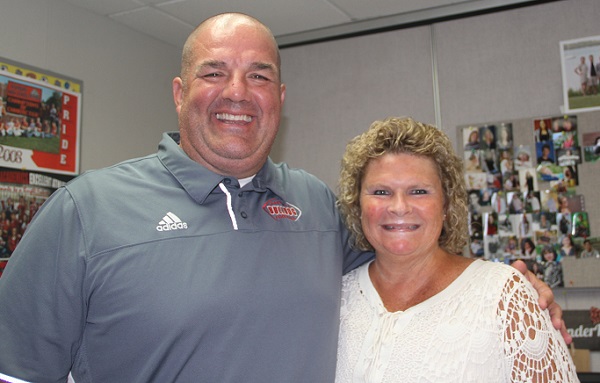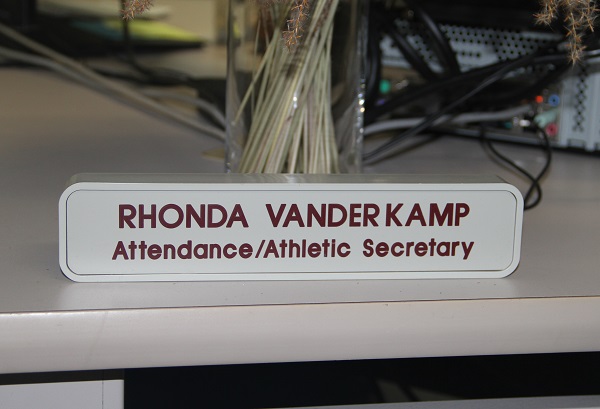
Southwest Schools Begin League Shuffle
By
Wes Morgan
Special for MHSAA.com
December 6, 2016
Just when it seemed that the waters had calmed concerning conference realignment in Southwest Michigan, two area leagues are expected to lose a chunk of their respective memberships with the berth of a new alliance.
 It was announced in June that Bronson would be leaving the Berrien-Cass-St. Joseph League at the end of the 2016-17 school year to join the Big 8 Conference. The BCS began in 2014.
It was announced in June that Bronson would be leaving the Berrien-Cass-St. Joseph League at the end of the 2016-17 school year to join the Big 8 Conference. The BCS began in 2014.
Now, all three St. Joseph County schools — Centreville, Mendon and White Pigeon — along with Cass County seat Cassopolis, are expected to exit the BCS this year as well. Those schools are joining Southwestern Athletic Conference defectors Bangor, Bloomingdale, Eau Claire, Hartford, Decatur and Marcellus to form the Southwest 10 Conference.
Seven of the 10 school districts have already voted in favor of the new league, with the last three unnamed schools expected to vote the same way later this month.
Once again, football was a driving force, though several other factors sparked the initial discussions back in August. It was important for Centreville, Mendon and White Pigeon to stick together after a long run dating back to the St. Joseph Valley League.
Competitive fairness and logistics were two other key concerns.
“(The SAC schools) came into this meeting stating the No. 1 goal is to not have a mega conference,” Mendon co-athletic director Glen Samson said. “They tried to get us to strike while the iron is hot. At the same time they are discussing this with us, the superintendents of the SAC and the BCS wanted us to all get together and form an even larger league, like 35 schools.
“We’ve just not had a whole lot of luck with this large conglomerate. It’s not really a league. You can see people voting on party lines, so to speak.”
A big obstacle in the BCS was football scheduling. The BCS did not make it mandatory that teams play cross-divisional games, which left some schools in the lurch when it came to filling out a nine-game schedule.
For instance, Mendon had to drive to the Upper Peninsula in Week 9 to play Manistique after finding no takers from similar-sized schools and with no desire of its own to compete against the likes of Class B programs up to three times a year.
Current BCS schools like Berrien Springs, Buchanan, Comstock and Parchment — all with about 450 students or more — are twice the size of schools like Mendon (203) and Cassopolis (278).
 “This idea came across our table, so we took a look at it,” Samson said. “The schools involved want to keep it to 10 teams. The more we got into it, the more it made sense.
“This idea came across our table, so we took a look at it,” Samson said. “The schools involved want to keep it to 10 teams. The more we got into it, the more it made sense.
“When Bronson left, it left us with four teams in our division in football. All that guaranteed Mendon, Centreville and Cass were three games. We’re sitting here with three games, and we have to find six and we have to now play two or three Class B schools to fill out a schedule in a league of 18 teams. This is not right.”
A 10-team league solves that issue and makes for easier organization of all other sports. More often than not, Samson and Cassopolis athletic director Matt Brawley agreed, coaches didn’t even know what division their school was in as the groupings changed by sport.
“Scheduling and getting the bylaws in order,” are at the top of the priority list for Brawley. “Right now, things seem to be running pretty smoothly. We have a great group of athletic directors and superintendents working diligently.”
If all goes according to plan, schedules will take care of themselves in the Southwest 10 since most schools offer the same sports. There are five schools that offer soccer with a sixth considering adding it for next season. A positive byproduct would be less travel time.
“For Cass, logistically, our furthest drive (would be) 37 miles,” Brawley said. “Marcellus and Decatur are our next-door neighbors. It doesn’t make much sense not to play them (as is the case now).
“I’m very excited,” Brawley said of a new league without divisions. “What I’m most excited about is being in a league where you’ve got to (likely) win nine games to win the conference championship or go 17-1 or 16-2 in basketball. It holds a lot more weight. The BCS is a great bunch of people, but this opportunity makes the most sense for us.”
 Wes Morgan has reported for the Kalamazoo Gazette, ESPN and ESPNChicago.com, 247Sports and Blue & Gold Illustrated over the last 12 years and is the publisher of JoeInsider.com. He can be reached at [email protected] with story ideas for Berrien, Cass, St. Joseph and Branch counties.
Wes Morgan has reported for the Kalamazoo Gazette, ESPN and ESPNChicago.com, 247Sports and Blue & Gold Illustrated over the last 12 years and is the publisher of JoeInsider.com. He can be reached at [email protected] with story ideas for Berrien, Cass, St. Joseph and Branch counties.
PHOTOS: (Top) Centreville and Marcellus face off in a girls basketball nonleague matchup. (Middle) Mendon and Casspolis will bring their football rivalry to the new Southwest 10 Conference. (Photos courtesy of Wes Morgan.)

Indispensable Only Begins to Describe Vicksburg Athletics 'MVP' VanderKamp
By
Pam Shebest
Special for MHSAA.com
September 20, 2022
VICKSBURG — Reading, traveling, enjoying time with family and sitting by the pool are all on Rhonda VanderKamp’s retirement list.
 But before she embarks on that journey in June, she is finishing her 21st year as Vicksburg High School athletic secretary.
But before she embarks on that journey in June, she is finishing her 21st year as Vicksburg High School athletic secretary.
One person not looking forward to that June day is Vicksburg athletic director Mike Roy.
“I keep waking up every day coming to work, and maybe she’ll tell me I’m going to do one more (year),” Roy said.
“Like the Tampa Bay Buccaneers when Tom Brady retires, they’re going to dearly miss him. That’s the best analogy I can give; that’s how important she is to the team we have here.”
Roy should know.
The two have worked together all 21 years, forming a work family that’s become an anomaly in the world of high school athletics.
Her own family is the reason VanderKamp landed at Vicksburg.
She left her job at Heco, formerly Hatfield Electric, in Kalamazoo, after 17 years because “I wanted to be on the same schedule as what my kids were,” she said. “This allowed me to have my summers off with them and Christmas and spring breaks. It’s been just fantastic.
 “Both of them were athletes in school. My daughter was in middle school when I started. I think it was good for them to have me here when they were in high school.”
“Both of them were athletes in school. My daughter was in middle school when I started. I think it was good for them to have me here when they were in high school.”
VanderKamp and Roy were hired into the athletic department within a month of each other.
She realizes how unusual their tenure is when she attends conferences.
“They’ll ask you to stand up, introduce yourself and say what school you’re from, how many years you’ve been an athletic secretary and how many athletic directors you’ve been through,” she said.
“It’s always such pride for me to say I’ve been an athletic secretary ‘X’ amount of years and I’ve only had one athletic director. That’s just not heard of these days.”
Roy, always quick with a quip, looked back at their first year working together.
“I told her from Day One: I’m like a new husband. You train me the way you need me to be,” he laughed.
He then got serious: “She’s the MVP. There’s so much stuff that gets done in this office behind the scenes, and it’s all because of Rhonda VanderKamp.”
Roy is not the only one calling VanderKamp “MVP.”
Seven-year wrestling coach Jeff Mohney echoes that sentiment, noting that his wrestlers call her Mrs. Rhonda or Mrs. V.
“She has never told me ‘no, I don’t have time for that,’” he said. “She handles everything from contracts, referee fees, cancelations, and student-athlete eligibility. She knows every student at Vicksburg and most of their parents.
“What separates her from others is her commitment to the coaching staff and the student-athlete. She is family-driven and lets us be a part of that. She shares stories of her family and asks about ours as well.”
Mohney said one portion of their tenures together stands out in his mind.
“Her commitment to us was not more evident than when masks were required at school,” he said. “We didn’t see her face for over a year. She was trying to keep her families safe to the best of her ability.
 “Now the highlight of my day is seeing Mrs. Rhonda’s smile. Vicksburg wrestling would not be relevant without Mrs. Rhonda’s commitment to us.”
“Now the highlight of my day is seeing Mrs. Rhonda’s smile. Vicksburg wrestling would not be relevant without Mrs. Rhonda’s commitment to us.”
One of VanderKamp’s proudest achievements during her 21 years was the addition of 10 varsity sports: hockey, equestrian plus boys and girls clay target, bowling, lacrosse and skiing.
In addition to her athletic secretary duties, she is also in charge of coordinating attendance and discipline.
“All the sick kids, the late kids, the kids who need to leave early all come through my office,” she said.
“Discipline also comes through my office, although I have help with that now.”
Her typical day begins about 7 a.m., and she is usually greeted by the ringing of phones.
“The kids are coming in with notes they have to get out early, parents are calling for sick children, I’m listening to (phone) messages,” she said.
“Once school starts, it’s constant activity. I always make sure I confirm my refs scheduled for that day, make sure my rosters are ready to go.
“Mike always double checks transportation. It’s a cycle. You just know what needs to be done, and you go with it.”
She said the job has also become a lot busier with the additional sports including “entering every athlete into the athletic software, making sure they’re all getting their awards, keeping on top of coaches when they add athletes, submitting pictures once I receive them onto our website and to boosters so we can print a booklet for each season.”
Time to travel abroad
The travel part of her retirement will include a trip to the Netherlands to visit Suzan Hauwert, who lived with the VanderKamps during the 2001 school year, and to Germany to visit Annika Busch, who lived with the family in 2003. Both were exchange students.
In addition, “My husband spoke Dutch before he spoke English, so his parents came right over on the boat,” the soft-spoken VanderKamp said.
Her husband, Gerrit, was in the U.S. Army and stationed in Germany, so they also plan to visit some of his old bases.
While VanderKamp has never visited Europe, both exchange “daughters” have been back to Vicksburg several times to visit.
 “Both were in my daughter’s wedding five years ago,” she said. “They’ll join us on vacations or come to visit. It’s such an intense bond we share with them.”
“Both were in my daughter’s wedding five years ago,” she said. “They’ll join us on vacations or come to visit. It’s such an intense bond we share with them.”
She also is looking forward to spending more time with 2-year-old granddaughter Presley, who lives in Portage with parents Andrea (VanderKamp) and Michael Prior.
Son Robert, and his wife, Shelby, live in Kalamazoo.
While she expects to leave her job in June, she said she does not need a lot of praise or attention – but deservingly is receiving it.
One of those praising her is Vicksburg’s 16-year volleyball coach Katrina Miller.
“Rhonda is a miracle worker” Miller said. “I swear she can do it all!
“As far as impacting my sport, it’s always nice for me to know that things are in order with my team and their paperwork and information.
“I have emailed her at odd hours looking for copies of physical forms or eligibility for tryouts and she is always right on it. She is going to be very missed, but we are happy that she will be able to have some time with herself and with her family.”
While her daily job may be over in June, VanderKamp and the Bulldogs will see each other again.
“I love the kids, I love my co-workers,” VanderKamp said. “I plan to sub if they need me in the office, so it’s not really goodbye. It’s ‘See you around.’”
 Pam Shebest served as a sportswriter at the Kalamazoo Gazette from 1985-2009 after 11 years part-time with the Gazette while teaching French and English at White Pigeon High School. She can be reached at [email protected] with story ideas for Calhoun, Kalamazoo and Van Buren counties.
Pam Shebest served as a sportswriter at the Kalamazoo Gazette from 1985-2009 after 11 years part-time with the Gazette while teaching French and English at White Pigeon High School. She can be reached at [email protected] with story ideas for Calhoun, Kalamazoo and Van Buren counties.
PHOTOS (Top) Rhonda VanderKamp sits at her desk as she begins her 21st year in the Vicksburg athletic department. (2) VanderKamp has worked all 21 years alongside athletic director Michael Roy. (3) The VanderKamp family, from left: son Robert VanderKamp, daughter-in-law Shelby VanderKamp, son-in-law Michael Prior, granddaughter Presley Prior, daughter Andrea Prior, Rhonda VanderKamp, husband Gerrit VanderKamp and father Bob Rainwater. (4) Rhonda VanderKamp has welcomed thousands of students during her time as athletic and attendance secretary. (Top two and bottom photos by Pam Shebest; family photo courtesy of Rhonda VanderKamp.)

